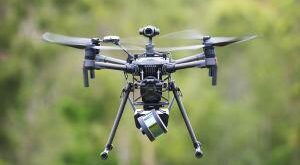By DRONELIFE Staff Writer Jim Magill
A recent decision by a federal judge will allow a lawsuit, challenging the constitutionality of Texas drone law, to move forward.
On November 30, US District Judge Robert Pitman handed down an order denying a motion made by attorneys representing the state defendants to dismiss the case. The suit, which was brought by the National Press Photographers Association, the Texas Press Association and a Texas-based photojournalist, claims that Texas drone law restricts journalists’ ability to use photos and videos shot from drones for newsgathering purposes.
The lawsuit names as defendants, Steven McCraw, the director of the Texas Department of Public Safety; Ron Joy, chief of the Texas Highway Patrol; and Wes Mau, the Hays County district attorney.
The suit challenges the surveillance provision of the law, which makes it unlawful to “capture an image of an individual or privately owned real property in [Texas] with the intent to conduct surveillance.” The plaintiffs argue that the law is unconstitutionally vague, in that it doesn’t define what constitutes “surveillance.”
In addition, the plaintiffs allege that the surveillance provision improperly discriminates on a content basis against UAV-produced photos and videos created as part of a newsgathering process, while allowing other groups, including students, engineers and insurance company employees to capture and use the same images for their own purposes.
The plaintiffs also challenged the “No Fly” provisions of the statute, which prohibits drone operations over correctional or detention facilities as well as critical infrastructure facilities, such as oil and gas pipelines, water treatment facilities and chemical plants. As in its pleadings against the surveillance provisions, the suit claims the restrictions are overbroad, in that they contain exemptions allowing drones to be used for commercial purposes, but not newsgathering purposes.
In addition, the suit argues that the “No Fly” provisions violate the doctrine of federal pre-emption of state law, because the Federal Aviation Administration has the exclusive right to regulate all air traffic.
In their motion, the defendants had argued that Pitman should dismiss the case because the plaintiffs had failed to present valid arguments against the surveillance and “No Fly” provisions. However, in his ruling the judge upheld as legitimate the plaintiffs’ arguments concerning the surveillance provisions and the overbroad nature of the “No Fly” provision.
In a partial victory for the defendants, Pitman ruled that the plaintiffs failed to present a valid pre-emption argument against the “No Fly” provision, and said that argument must be dismissed from the case. The remainder of the case, however, will be allowed to go on, he ruled.
Attorneys for the plaintiffs cheered the judge’s decision to keep the case alive.
“We obviously are pleased by the ruling. We think that the judge looked at the law and the facts, as we had presented them, very carefully and came to the conclusion that we did in fact state a viable case,” Jim Hemphill, attorney for the Texas Press Association, said. “Several of these drone restrictions are unconstitutional because under the First Amendment they’re overly restrictive of protected activities.”
He added that he was disappointed with the portion of the judge’s ruling concerning the issue of pre-emption, as he believed the plaintiffs could prove that the Texas drone law trampled on the FAA’s exclusive right to regulate UAV operations.
“On the other hand, the judge’s dismissal of the pre-emption claims doesn’t affect our clients’ ability to get all the relief asked for,” he said.
Mickey Osterreicher, general counsel of the National Press Photographers Association, agreed.
“It would be nice to also have the pre-emption cause of action go forward, but given everything I think we’re in a really good place and are pleased with the judge’s ruling,” he said.
Osterreicher said the ruling clears the way for the case to move forward, although the state still retains the right to appeal the decision. Barring the success of such an appeal, given the ruling the plaintiffs will now have to answer the issues the plaintiffs raised in their suit.
In addition, either side could move for a summary judgment in the case. “Since we prevailed on the motion to dismiss, there could be a motion for summary judgment and if we win on that – assuming it wouldn’t be appealed — there wouldn’t be any need for a trial,” Osterreicher said.
The case is set to go to trial next October, which means that if the judgment goes in favor of the plaintiffs, the state legislature will not be able to make any changes to the drone law until 2023. The legislature, which only meets every two years, is scheduled to begin its next five-month session in January.
“If those sections of the law are ruled unconstitutional, that means that the state can’t enforce them. That way people could have some certainty in terms of what they can and can’t do using drones in newsgathering,” Osterreicher said.
Miriam McNabb is the Editor-in-Chief of DRONELIFE and CEO of JobForDrones, a professional drone services marketplace, and a fascinated observer of the emerging drone industry and the regulatory environment for drones. Miriam has penned over 3,000 articles focused on the commercial drone space and is an international speaker and recognized figure in the industry. Miriam has a degree from the University of Chicago and over 20 years of experience in high tech sales and marketing for new technologies.
For drone industry consulting or writing, Email Miriam.
TWITTER:@spaldingbarker
Subscribe to DroneLife here.
https://dronelife.com/2020/12/11/texas-drone-law-court-decision-allows-challenge/
 Unmanned Aerial Vehicle The latest drone news
Unmanned Aerial Vehicle The latest drone news





